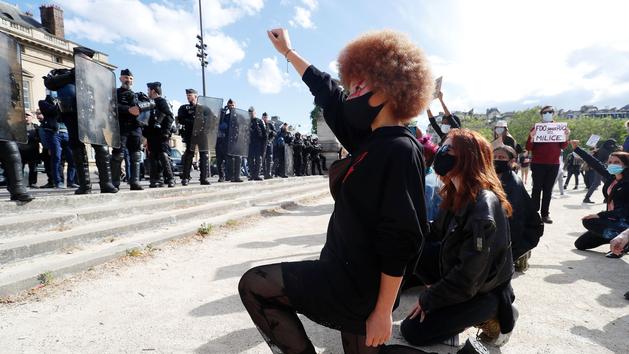Serge Barcellini is General President of Souvenir Français.
On January 30, 2004, President Jacques Chirac declared during the installation of the Committee for the memory of slavery:
“The greatness of a country is to assume all its history.
With its glorious pages but also with its dark side.
Our history is that of a great nation.
Let's look at it with pride.
Let's look at it as it has been.
This is how a people comes together, how they become more united and stronger. ”
Does commemorating the dark pages of our history unite the Nation?
"In the Republic, we can tell each other everything about our history (...)".
Through this speech, Jacques Chirac translates the majority intellectual and media doxa in our country.
Any criticism of this majority thought is made at the expense of the person who formulates it, as the Prime Minister has just seen.
But this thought is only the expression of a memorial policy, and like any policy we have the right and the duty to discuss it.
Before Chirac there was Renan.
From his famous lecture given at the Sorbonne on May 26, 1882 under the title “What is a nation?”
that many politicians on the left and the right quote extensively, only one expression is retained, that of the everyday plebiscite.
A nation is built on consent, the expressed desire to continue living together,
"the existence of a nation is a daily plebiscite, just as the existence of the individual is a perpetual affirmation of life".
This historically connoted expression - 13 years earlier the French had overwhelmingly placed their trust in Napoleon III - cannot sum up the thought of Ernest Renan who makes the nation rest on two pillars, consent and the common past.
For Renan, a nation is built on
"the possession in common of a rich legacy of memories".
The management of this
"legacy of memories"
is the basis of a memorial policy that fits in with its time.
In 1882 it was indeed necessary to transform the humiliating defeat of the French armies of 1870-1871 into a "victorious defeat".
"In terms of national memories, bereavements are better than triumphs, because they impose duties, they command the common effort."
It is also necessary to make heroes emerge:
"A heroic past, great men, glory (I mean the real one) is the social capital on which a national idea is based."
These heroes are the combatants killed in action in 1870, for whom collective graves were created for the first time.
This memorial policy was unchallenged until the 1980s.
The memorial policy has only one objective, to build the Republican Nation.
The shared griefs are those of the First and Second World Wars.
The heroes are the “Morts pour la France” for whom a mention was created in 1915, a mention now attributed to 586 combatants who died in foreign operations.
This memorial policy has only one objective, to build the Republican Nation.
It is this policy that we apply today when we pay homage to the poilus of 1914 around Maurice Genevoix, to General de Gaulle within the framework of the Gaullian year, to the Just of France, to the Senegalese tirailleurs.
This is the policy pursued since 1887 by the memorial association Le Souvenir Français.
But this policy, like any policy, has its “safeguards” that Renan presented in his conference.
The first concerns forgetting.
“The essence of a nation is that all individuals have a lot of things in common, and also that all have forgotten many things (…) every French citizen must have forgotten Saint-Barthélemy, the massacres of the South in the 13th century ".
For Renan, a memorial policy which would have activated the memory of the Saint-Barthélemy massacres would have been likely to slow down the integration of the Protestants into the nation.
The second safeguard concerns historical research:
“Forgetting, and I would even say historical error, is an essential factor in the creation of a nation, and it is thus that the progress of historical studies is often for. nationality a danger. ”
The illustrious author of The Life of Jesus thus draws a parallel between historical studies on religion and those on the nation.
The historian, when he transforms himself into an actor of memory, is a danger for the latter.
It is these two safeguards that have been removed in the new memorial policy developed since the beginning of the 21st century.
The whole memory has replaced the sorting of history.
Forgetting is ruled out and historians have established themselves as the central players in memory policies.
No commemoration can now be set up without a scientific committee with a decision-making role.
The time has come to reflect on our memory policy because memory is also a policy.
This confusion between historical research and commemoration favors research on the dark pages of our history, pages that had been little worked on in previous decades.
It is this memorial policy which is at work today for colonization, the wars of decolonization and slavery.
As the 60th anniversary of the end of the Algerian war is preparing, between March and July 2022, even though France will be in presidential and legislative elections, it is up to us to wonder about the results of this new memorial policy.
After 20 years of application, it is possible to draw a first assessment.
Has the feeling of belonging to the Nation been strengthened?
Commemorating the massacres in Madagascar, Cameroon, or Thiaroye has it made it possible to better integrate our fellow citizens of African origin into the Nation?
Shedding light on the massacres in Sétif and the tortures in Algeria has it enabled our fellow citizens of Algerian origin to feel better French?
Did teaching the only European and French component of slavery give all our fellow citizens of African origin the pride of belonging to France?
Did mentioning crimes against humanity to define colonization allow France to be better perceived by our former colonies?
So many questions that it is necessary today to ask ourselves at a time when France is facing the development of radical Islamism and when 45% of young Muslims consider Islam incompatible with the values of our republican nation.
The time has come to reflect on our memory policy because memory is also a policy.







/cloudfront-eu-central-1.images.arcpublishing.com/prisa/KMEYMJKESBAZBE4MRBAM4TGHIQ.jpg)


